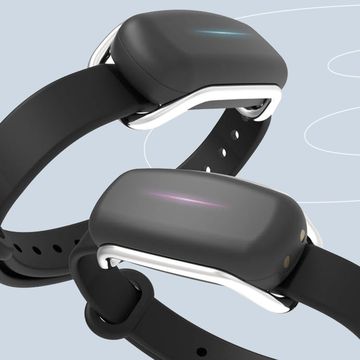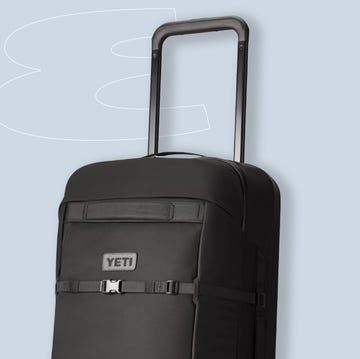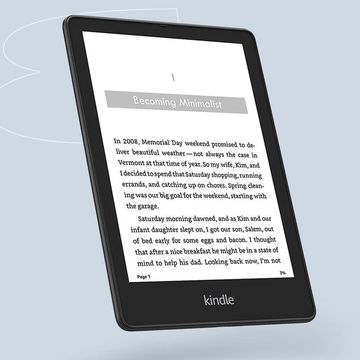Gentlemen, take heed. Our children are getting soft. Not just wimpy, or less sharp, but doughy. And pale, too. As the generation that has overseen childhood obesity levels quadruple and the induction of nature deficit disorder, we should be ashamed.
What happened to childhood? It's turned into on-the-job training for overworked, overachieving, and overstuffed future stroke and heart attack victims, shielded from what should be the best days of their lives by a hyper-competitive culture and paranoia towards unfounded, statistically improbable dangers.
The National Center for Missing and Exploited Children reports that, since 1983, 293 babies were abducted by non-family members out of around 120 million born domestically. Of those taken, only five are still missing. You're way, way more likely to be attacked by a lion or struck by lightning than you are to be the victim of a baby-snatching. Yet parents dote and hover and over-medicate more than ever.
Our control freak quest to provide the perfect childhood and produce the perfect child is backfiring. Or worse: It is just making our kids hurt themselves.Even as we spend our days like perfectionist fairy godmothers floating above our children—trying from birth to sculpt Baby Einsteins, constantly dousing them with sanitizer, sourcing single origin organic whole foods, ensconcing them in bubble wrap and armored accoutrements just to teach them to ride a tricycle—we are still fucking blowing it on a fundamental level. All this overly-compensated smothering is just leading to a population of wimpy, binge-drinking stalkers who can't cope with day-to-day life, spiraling towards a lifetime of prescription medication Band-Aids.
15% of college students now experience from chronic anxiety, self-mutilation is rampant, affecting 15% of all adolescents, and 40% of women in college will suffer from anorexia or bulimia, all in an attempt at exerting some form of control over their own lives. This same innate need to be their own person is a leading cause of over-drinking, which reduces the above anxiety and also requires little to no social skills; and that same lack of social skills and experience with relationship development leads to stalking and violence.
What's that saying about the road to Hell's pavement again?
Take a look in any elementary school classroom. These children are immaculate. Shining, as though freshly popped from a blister pack and dipped in disinfectant before being put on display, glowing with the sort of translucence associated with blind, cave-dwelling salamanders. Except they don't live in a cave. It's just that the only glow they're ever allowed to bask in is the cold blue one given off by a screen.
And it's not solely the digital pacifiers of helicopter parents, video games and an On Demand morphine drip that are to blame. Kids, quite simply, need to do other stuff.
Social, active, unstructured stuff. Play war, chase, tag, build jumps and tree forts. Catch bugs. Beat the shit out of each other with sticks. Seems like the only time you see kids out in the "wild," it's because someone needs fodder for their mommy blog or social media account, and you better believe they aren't getting those hand-sewn organic jeans dirty, let alone bloody. According to Mashable, 14 percent of American moms read mommy blogs, and 3.9 million identify as "bloggers," themselves.
Apparently in their exhaustive parenting research, mom and dad missed the study showing that ADHD symptoms can be quelled with outdoor play.
In our protectiveness, we are doing our children a disservice. And it's because we're all afraid.
Between the Internet's intensity to shock us with every headline, we've drawn the blinders so tightly that there's a nationwide epidemic of vitamin D deficiency. But what are we afraid of? Crime is at an all-time low. Our kids are statistically way less likely to be the victim of assault, physical or sexual, than they were when we were kids, wandering about town without so much as a cell phone.
"A-ha!" You say, "this is because we hold our babies ever closer to the protection of the nest!"
Wrong.
Crime in general is down by almost half since the early '90s. And, fun fact, of all the children under five murdered between 1976 and 2005, 97 percent of those homicides were committed by a parent, relative, or close family friend.
When we're not afraid of grievous harm, we're afraid of a failure to launch.
We want our children to go forth and conquer—to be the kings of their destiny. This means increasing pressure to perform academically. Increasingly high standards from parents, leading to increasingly high stress levels amongst our youth.
And, believe what you may, this is not just about the children.
We're not just genuinely afraid for the financial and social well being of our offspring, we're afraid of the cultural shame we, as parents, face when they don't perform in the top percentile of any given activity.
We don't, as parents, want to face our our fate as failed breeders who couldn't deliver a "gifted" child, skilled in quantum mathematics. And so parents have (as study after study has shown) bought into a bloated, profit-driven health care system more than ever before—and industry stuffing children full of amphetamines to focus attention or pills to balance moods.
But, dare we say it, maybe they aren't "shortcomings." Sometimes in life you just suck at stuff.
And that's totally okay. Repeat after me: "It's okay to suck at stuff."
Because they'll almost definitely be good at something else. Long before we were playing classical music to our wives' wombs, children were running amok, throwing rocks at each other, being wild, and then still somehow growing up to win the Nobel Prize or be president or none of these things, but still, simply, having a good and happy and full life.
Getting lost in the woods and figuring out how to get home, chasing squirrels, playing hide and seek, learning that there's nothing in the dark to be afraid of, falling and getting the air knocked out of you and getting up to dust yourself off and laugh at it with everyone else—these are important things. Life skills that can't be taught while coddled in a padded room or plugged into a console babysitter.
Children, while precious, shouldn't be precious. Kids are balls of energy—and keeping all that energy stifled, tamped down in a more and more tightly controlled space, doesn't make it go away. It just makes it explode when it finally gets free, or, conversely, implode, leaving rage and depression in its wake. Either way, it's a bad situation for them, and often those around them, when it happens.
Explosions, by nature, are a destructive force, and we're creating a generation of powder kegs. We owe them, our future generations, better. And we know this is a problem. Titles like the Dangerous Book for Boys don't sell millions of copies and become star-helmed TV shows on whimsy alone. They get to where they are by speaking to a nervous, unsaid rumbling, deep in our guts, of a better version of ourselves.
And our gut is saying this: Yes, our kids will fall down and get scuffed up, come home dirty, sunburned, nicked, exhausted, and challenged. But they will have lived. And they will be stronger, and happier, for it.
Want to make a positive difference in a child's life? Here's a way you can help.














